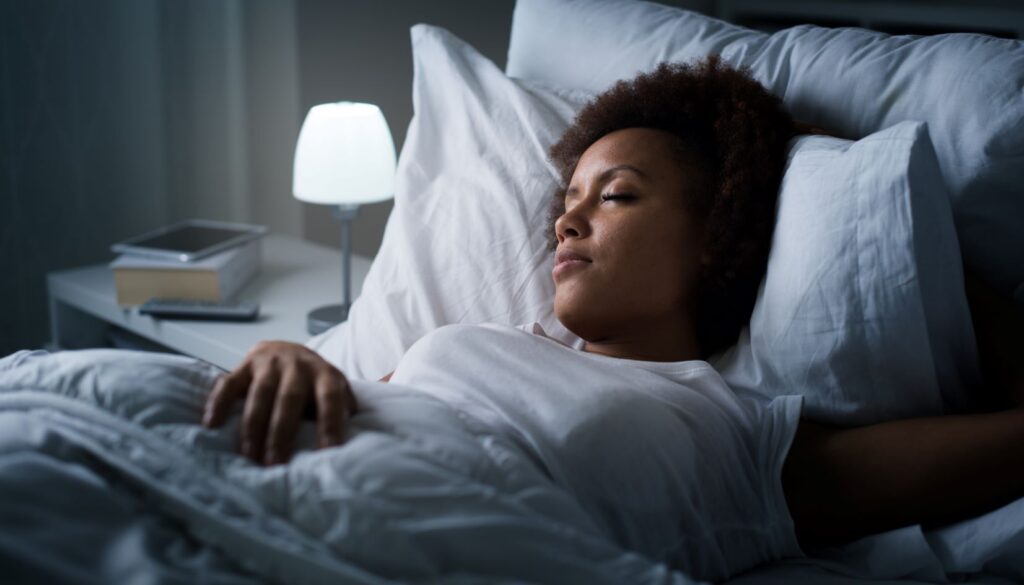The connection between sleep and health is clear—sleep has many science-backed benefits.
Sleep naked? Well, there’s no direct evidence that sleeping naked improves your health.
But if sleeping naked makes you feel cooler and more comfortable, which in turn helps you sleep better, then the practice may help improve your health. It turns out that sleeping naked may help regulate your body temperature, which in turn improves your sleep.
According to the Centers for Disease Control, getting enough sleep can help you maintain a healthy weight, improve your mood, and reduce your risk of heart disease and type 2 diabetes.
Four potential benefits of sleeping naked
The temperature of your room can affect the quality of your sleep—for better or worse. That’s why a cool room (and a cool body!) can benefit your sleep and overall health. All this rest has other health benefits, too.

1. Can help you fall asleep faster
Temperature is a key factor in helping you sleep. This is because your sleep cycle is tied to your body’s circadian rhythm, which is the physical, mental and behavioral changes you experience over a 24-hour period. The timing of day and night is a major driver of circadian rhythms, which influence functions such as hunger, hormone levels, and sleep patterns. Circadian rhythms also affect body temperature, causing people to feel hotter or colder at different times of the day.
At the end of the day, your circadian rhythm triggers the release of melatonin and lowers your core temperature. A drop in body temperature promotes drowsiness, making it easier to fall asleep and stay asleep. The Cleveland Clinic notes that too much heat can lead to disrupted sleep and insomnia at night. Research shows that the optimal room temperature for sleeping is 66 to 69 degrees Fahrenheit.
One of the great benefits of sleeping naked is that the contact of your bare skin with the air keeps you cool. Staying cool can help you fall asleep more easily. Being naked also prevents you from getting too hot at night.
2. May help boost metabolism
Taking off your clothes overnight may help lower your skin temperature and boost your overall metabolism. Some studies show that staying cool while sleeping forces your body to work harder to maintain a body temperature of 98.6 degrees. A special type of body fat called brown adipose tissue is essential for producing body heat. Brown fat needs energy to work, so it taps into the stores of white fat cells to do its job.
Research shows that quality sleep activates brown fat activity and boosts overall metabolism. A cool room and exposed body can improve sleep quality and give brown fat a chance to work its metabolic magic.
Sleep quality also affects metabolism and carries over into waking life. Research shows that getting six or more hours of quality sleep each night is linked to weight loss. The reasons are complex. For one thing, sleep deprivation seems to trigger the desire to snack. People who are chronically sleep-deprived are more likely to energize themselves by eating high-calorie snacks to offset low energy levels during the day.
Lack of sleep can also have a negative impact on metabolism. Experts believe that sleep deprivation suppresses appetite control, which in turn affects metabolism and leads to weight gain.
3. Can reduce stress levels and overall anxiety
Sleep quality affects mental health and vice versa. Stress and anxiety can trigger sleep problems such as insomnia. At the same time, fatigue caused by lack of sleep can make feelings of anxiety and depression more obvious. A 2021 study on sleep and mental health found that sleep deprivation, or REM sleep, was associated with higher rates of mental health problems.
Stress can make falling asleep difficult. Do you often lie in bed with your mind racing instead of relaxing and taking a break?


4. Can improve your skin health
The idea of beauty sleep has a surprising scientific basis. A good night’s sleep not only reduces the risk of waking up with dark circles. A 2022 study showed that sleeping late can reduce your skin’s hydration levels, firmness, and elasticity. Another study showed that poor sleep quality is associated with increased oil production and reduced skin elasticity and hydration.
Going to bed early and not getting dressed can be helpful elements in your nighttime skin care routine.
The role of nutrition in sleep quality
Another factor that contributes to sleep quality is nutrition. What you eat can affect the quality of your sleep.
There’s plenty of anecdotal data on how fried foods, spicy foods, alcohol, and caffeine can make you toss and turn. On the other hand, scientific evidence shows that a balanced diet can improve sleep quality. Recent research shows that the best eating plan to improve sleep is a protein-rich diet that includes sleep-friendly amino acids such as tryptophan, which is found in lean meats, dairy products, and legumes. Eating high-antioxidant fruits, such as cherries and kiwis, and low-glycemic carbohydrates, such as whole grains, legumes, and nuts, may also support sleep.
You can see how your diet affects the quality of your sleep in the MyFitnessPal app. Just pair your MyFitnessPal account with your health data from apps like Health Connect or Apple Health. MyFitnessPal will show you how your daily food, water and exercise choices affect your sleep patterns.
Bottom line: stay cool, stay comfortable
Whether you choose to sleep naked or not, being comfortable and cool can help improve your sleep. Ditch your pajamas, open the windows, turn on the air conditioner—just stay cool and you’ll get better rest, and therefore better health.
Originally published August 28, 2020 | Updated June 25, 2024

